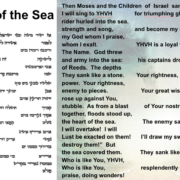I Will Sing
In this week’s Torah portion, Beshalach, we read the Song at the Sea. “I will sing to God…” Our commentators note that this verse is in future tense: not “I sing,” but “I will sing.” Hold on to that; we’ll come back to it.
The rabbi of the Warsaw Ghetto, the Piazeczyner, notes that many of our psalms are called songs. They name themselves that way, in the opening phrase. The name “songs” seems to imply praise and thanksgiving, but often these psalms contain sorrow and fear. So why don’t we call them laments? Why do we call them songs, even when they express something painful?
Talmud teaches us to call them songs because that name reminds us to seek the spark of good within the pain. Phrased another way: a “song” is something that’s authentic. Song doesn’t just mean happy-clappy, it means expressing the heart. Sometimes what we have to express is sorrow and fear, but that expression opens us to a spark of good within whatever’s unfolding.
And… the Piazeczyner notes that it can be difficult, almost impossible, to truly sing while enduring suffering. “In order for a person to sing, their essential self — heart and soul — must burst into song.” And sometimes, we just can’t get there.
I underlined that phrase in my book because it speaks to me so deeply. It can be difficult, almost impossible, to truly sing when we’re suffering. Some of us may be finding it difficult to sing in month eleven of the pandemic. Tired of staying home, fiercely missing other human beings, fearful of new and more contagious variants, grieving more than 433,000 dead so far.
Some of us may be finding it difficult to sing because we’re lonely or worried about loved ones. Or because we’re still shaken by the violent storming of the Capitol building earlier this month, or distressed by conspiracy-minded voices that blame recent years’ wildfires on Jewish-funded space lasers. (I wish I were kidding about that.)
Sometimes, the Piazeczyner says, when the suffering is so great that our hearts feel crushed, we can’t find even a spark of rejoicing. That’s how he understands the kotzer ruach, constriction of spirit, described in our parsha a few weeks ago. We were so crushed by our suffering that we couldn’t even hear that things were going to get better.
And yet this week our story takes us to the Sea of Reeds. We’re leaving Egypt. We’re singing the Song at the Sea. How did we get from “unable to even hear hope” to “crossing the Sea toward liberation”? For me, the answer is in singing our own real songs.
If we can really inhabit the song of our hearts — even when it’s a fearful song, or an anxious song, or a grieving song — then we can be real with each other and with God. And it’s in that being-real that we find the spark of hope that gets us through.
There’s a debate about how the Song at the Sea was originally sung. Was it a call-and-response, in which Moshe sang each line and we sang it back? Or did we sing all together? Probably this debate arose because both of those were traditions, and somebody wanted to know which one was “right.” But in typical fashion, our sages turned that debate into a deep teaching.
In Egypt, our sages teach, we sang praises as a call-and-response. We couldn’t muster praise on our own, but we could repeat it. (So yes: call-and-response is correct.) When we crossed the Sea, we all sang together. Our own hearts sang out. (So yes: singing in unison is correct too!) Tradition even teaches that our song then-and-there arose from direct personal experience of God.
Sometimes all we can do is repeat someone else’s words. We repeat the words of our prayers, we mirror someone else’s hope. At other times our own song pours forth. Both of those are authentic spiritual life. And when we’re willing to be real, we open to our own song. That’s how — even when still in Mitzrayim — we became able to envision that things would someday get better.
That’s why “I will sing to God…” is written in the future tense: it speaks to the future song that we know we will someday be able to sing.
Someday we’ll be able to safely gather in person. Someday we’ll be able to safely sing together in person. Right now we may still be in Narrow Straits, but let’s be real with each other: that’s how we open the door to hope. Someday songs of praise will sing forth from our hearts when we sing together, when we dance together, when it’s safe to be together, on the far side of this Sea.
This is the d’varling that R’ Rachel offered on Shabbat morning at CBI (cross-posted to Velveteen Rabbi.)
Shared with gratitude to my hevruta R. Megan Doherty for studying the Aish Kodesh with me this week.
Image source: R. David Markus.






